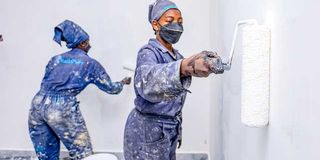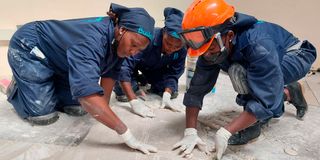Breaking ground: Meet the women demolishing barriers in construction industry

Fundis at work.
What you need to know:
- Globally, only 13 per cent of construction companies are owned by women.
- Buildher co-founder says they launched a training programme and trained 30 youth in carpentry, joinery and installations.
When Pumi Lukhele graduated with a construction management degree, she faced a harsh reality—contractors didn't want to hire women on-site, worse still, a black one.
“I still have my graduation photo where you see all these white males, and then me—a small black female,” the 43-year-old South African who graduated from the University of Pretoria recalls.

Pumi Lukhele, the head of construction and development at the East Africa for Gateway Real Estate.
Pumi's luck turned when a real estate developer sought a junior resource from her university, and she was recommended.
“In hindsight, it's a blessing in disguise because I enjoy development. That's where my journey started," she says proudly.
More than 15 years later, Pumi is the head of construction and development for East Africa at Gateway Real Estate Africa (GREA).
Yet, the script on women being sidelined in the sector remains largely unchanged. Research shows only three per cent of construction artisans in Kenya are women, 7.3 per cent of registered engineers are female, 15.5 per cent of contractors, and 17 per cent of quantity surveyors.
Globally, only 13 per cent of construction companies are owned by women.
This underrepresentation of women in the industry troubles Pumi and others, especially given construction's critical role in job creation as the government invests in major infrastructure projects like the expressway and SGR.
According to Trading Economics, Kenya's construction GDP hit an all-time high of Sh153,061 million in the third quarter of 2023, highlighting the sector's economic significance.
We meet Pumi at her current construction site in Tatu City, Ruiru, on the outskirts of Nairobi.
“Can you imagine we delivered this ahead of time—in 18 months instead of 22? We worked non-stop on a 24-hour cycle and had 1,300 people working in shifts," Pumi beams, showing a newly completed five-storey facility.
One thing that tugs at her heart is seeing more women join the industry. On Rosslyn estate, a 90-unit gated community built in 2022, they started with 15 skilled women artisans. At Eneo, they doubled that to 34.
Pumi says the gender blend at GREA has made the conversation easy.
“We had a 50-50, male, female split in our office. It almost felt like one day we woke up and we realised we were all females,” says Pumi, whose boss is also female.
The biggest battle, however, is at the grassroots—the contractor level where most unskilled and semi-skilled people work, and where many low-income women can benefit.
"For me, I was not given the opportunity because I was female at the entry level. And I didn't have an advocate...I desired to create such an opportunity for more women," Pumi says.
Despite her desires, her organisation was not in the business of contracting or training, making it difficult to immediately increase the number of women on sites.
"The first thing we did was to include women in our contractors' agreements," Pumi explains. When contractors asked, "Where are the women?"
We partnered with Buildher, a social enterprise that equips women in Kenya with accredited construction skills.
“They are in the business of empowering and training women in construction and we loved that they worked with women at the bottom," Pumi says.
A few days later, we met Tatu Gatere, the CEO and co-founder of Buildher. She left her architecture career to work for a design, build, and community engagement NGO in Kibera, Nairobi.
“I felt frustrated with my architecture career...I was interested in using local materials, and designing with consideration of communities," she explains.
It was in Kibera that the idea of an entity to equip women with construction skills was born.
“We launched a training programme and trained 30 youth in carpentry, joinery and installations. It blew my mind. I felt like we were changing lives,” she says.
"I realised that if you are to fight poverty, you need to start by changing the people's mind-sets," Tatu shares.
But getting women to enrol was initially challenging as they didn't see themselves represented in construction.

Women trained in construction trade skills like painting, joinery, and tiling among others.
“When I started, I wanted to train 30 youths – 15 women and 15 men. But I couldn't get any women. I begged them, went to their homes, and had chai (tea) with them. They would say yes, but never show up," Tatu recalls.
Alarmed, she went back to the drawing board to understand what was keeping women away.
"I learned that women didn't think construction was something they could understand. They thought it was too technical, too complicated – not for women. Society just reinforced that mind-set," she explains.
Tatu knew she needed to change this perception. "Were you old enough to see your grandma? Who built the houses then?" she asked, pointing out that traditionally, women were involved in construction.
"Yet we say getting women in construction is a Western thing!"
Her approach was to challenge the notion that construction wasn't done by women before. "Who told you it wasn't done before?"
With this, more people listened. However, there was still the issue of women feeling safe in groups.
As an outsider in Kibera, Tatu posed, "Who am I? How do they know me? What social capital have I established with them? My credibility?”
Talking to community influencers became her strategy. "We worked with youth groups, guys cleaning up, collecting garbage, and working at construction sites. We said, 'this is what we're doing...come visit us.' And then we asked them to help recruit women they knew."
It wasn't until 2019, a year after opening their doors, that they recruited their first female trainee.
Since 2019, they have trained 700 disadvantaged women, about 80 per cent of whom are still taking construction courses. Most of the women trainees, a few who are refugees, previously earned less than Sh200 a day.
Most significantly, around 70 per cent of them are single mothers. “We work with low-income women aged between 18 and 60 years. The oldest we’ve trained is 60. Many dropped out of school even in class four,” Tatu notes.
Besides technical skills, they also focus on holistic personal development, including financial literacy, entrepreneurship, sexual health, communication, leadership, mental health coaching, nutrition, and physical conditioning.
“The number one barrier that no one talks about is the amount of sexual harassment in the construction industry. In 2020, Women in Real Estate (Wire) released a report that showed that up to 94 per cent of women in the construction industry are sexually harassed," notes Eng Esther Segero, president of Wire.
Only 3.9 per cent of women report this to authority and when they do, most complaints are not taken seriously, Tatu says on the Wire report.
“Many young people join the industry and drop out within the first three years to join other industries. Sexual harassment is largely affecting our numbers,” Esther shares.
Male dominance is also deeply ingrained in the industry, with men traditionally occupying the majority of positions at all levels. Safety, sanitation, and proper gear for women working in construction are also challenges.
A survey found that one in five sites require women to share toilet facilities with men, and 10 per cent of sites do not supply toilet paper.
A significant issue many women face in the industry is the lack of well-fitting specialist clothing and work gear designed specifically for the female body.
Overalls, jackets, trousers, and general work apparel are predominantly designed with male bodies in mind. Even when women can find smaller sizes, these garments are not optimised to fit the female form properly.
The ill-fitting nature of such clothing can pose safety risks and discomfort, hampering women's ability to perform their jobs effectively on construction sites.
However, there is progress through industry collaboration. “Collaboration makes the dream work,” declares Esther.
Contractors like Engineer Robert Nyamonge notes that women are good at what they do. “Women are dedicated to their work, are honest, less ego-centric and great team players, values that are needed for us to finish projects on time,” says Robert.
He, however, notes that while women supervisors are on the rise, female artisans are few. “We need to emphasise skills transfer at TVETs. It should be compulsory for companies to take a specified number of students for mentorship and on-the-job skills transfer,” he says.
The real game-changer, according to Tatu, is entrepreneurship.
“It's a fact that sometimes women are paid less than men for equal work. The biggest game changer is for women to take on jobs independently.”
More needs to be done, including promoting gender inclusivity, investing in upskilling women, encouraging Stem education for young girls, establishing mentorship programmes, and implementing flexible work arrangements.
"I am happy to be a woman and on the other side of decision-making," Pumi says, noting the importance of her presence in dialogues with male contractors to accommodate women's needs.
Tatu concludes,
"Once you train a woman, you've trained her whole family and her community...Many of these women had no option but to have their children drop out.
Now they are telling you that they're taking their children to school past college. They are proud that their kids can have a better life."
Women fundis: we can do the job perfectly
Judith Juma Umano, 32, tiler
I hope to open a tile shop in the future. I grew up in a family of eight children. I dropped out of school in Class Eight for lack of school fees. My dad died when I was in Class Six. At the age of 17, in 2008, I had a child, and a second one in 2010. Life became difficult in the ghetto. In 2021, I got a third baby and life became unbearable. One day, I was passing through Baba Dogo, I saw some women wearing construction uniforms and I asked if I could get a chance and work with them. They offered me a training opportunity in construction. To register I needed Sh2,000 but I didn’t have the money. They offered me the training for free. I completed the four-month tiling course in March 2023, then started job placements on construction sites. I have been at my current placement for two months now. My firstborn is in Form Three, and the work has helped me pay rent, her school fees and buy food. I moved to a better house and.
Mineh Wanja, 29, a painter and decorator
If these women can do the work, I can do it too. I dropped out of school in 2013, in Form Three because of a lack of fees. I am an orphan. I then came to Nairobi and worked as a casual at Kariobangi Light Industries, making mandazi. I got married in 2019. In 2022, I saw some women doing construction work on social media. I thought if these women can do the work, I can do it too. I visited the construction firm and my journey as a painter and decorator started. My husband and I now support each other in paying house bills. We have been able to move to a better place. I want to be a foreman, and then open a hardware shop in the future.
Esther Wanjiku, 30, carpentry and joinery
Some foremen think a woman can’t do the job. I studied hospitality management in college and became a waitress and barrister. I, however, wasn’t fulfilled. I wanted something I could use with my hands. On my off days, I would help a local fundi with upholstery. Through him, I heard about an opportunity for women interested in construction. I visited the firm for an interview and was trained. I then got a job where I am working to date. Sadly, some foremen think a woman can’t do the job, and others also feel intimidated by a woman who has skills. Some men don’t want to work under a woman, while others want to flirt, but I draw boundaries. Again, women are often paid less than men - they say you don’t have a man’s physical strength. Sometimes, you don’t have a choice but to accept less pay. All in all, I love what I do. I want to be an expert. I now have a future.
Sophia Yuzigwa, 32, tiler
I now have self-drive and no longer dependent. I left school in Class Seven. I had to take care of my siblings as my mum had died. I got pregnant at 15, as I struggled to survive. I took my siblings to a children's home and moved to Kibera (Nairobi) to look for work. In 2018, I got my second child and started working in a club, which was unfortunately closed because of Covid-19. I then started hawking boiled eggs but the business didn’t pick up. I opted to work as a mjengo (construction) woman, carrying sand. In 2022, a friend told me about an organisation that was training women in construction. After the training, I got a few jobs as a tiler. I now have self-drive and am no longer dependent. I can pay my family bills. In the future, I want to start a construction business.
Celestine Ralak Ochieng’, painter and decorator
Consider us for the affordable housing project. The construction training has changed my life. I was a mama fua, and a woman I cleaned for, told me about training in construction. After Form Four, I moved to Nairobi in search of greener pastures, and in the process, I got pregnant. In 2022, I was trained in painting and decoration and got an opportunity at a construction site. I saved some money and was able to pay for my own rent and cater for my bills. I now get jobs through my networks. I earn between Sh1,000 and Sh2,000 a day. The only challenge is that our work is erratic and sometimes you can stay home for two weeks with no job. That’s why getting a long-term contract is good. I appeal to the government to consider us for the affordable housing project. Women can do an excellent job given the opportunity. I am now working to perfect my skills, and after NITA certification I want to get into university.
Florence Wakurugi, 28, joinery
I am proud to say I am a fundi. I dropped out of school in Form Three for lack of fees. I then got pregnant and married at 17. Life was tough in Nairobi and I moved to the village. Life was worse there. I moved back to Nairobi and we rented a house in Korogocho. I started casual work peeling potatoes in a Kibanda. In 2021, my neighbour told me about a construction opportunity for women. The construction training has built my confidence, and I now don’t wait to be called for work, I look for the jobs myself. I am proud to say I am fundi. Most men still don’t think a woman can do this job, but I ask them to give me the chance and if I don’t do a stellar job they can sack me. I always impress them.




